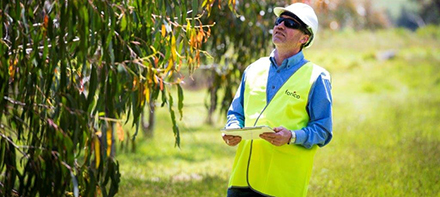Tasmania’s largest plantation forestry manager, Forico, has released a world-leading and Australian first Natural Capital Report, which puts the net value of its forest ecosystem at $3.4 billion and the value of sequestered carbon as high as $9.2 billion. Source: Timberbiz
The report sets a benchmark for business and industry in environmental stewardship and corporate sustainability reporting.
Natural Capital Reporting measures the value of natural assets alongside traditional metrics of production volumes and profit and loss. Essentially, it puts a dollar figure on how much the natural environment matters.
For the first time, Forico’s Natural Capital Report looks at the company’s core business of high-quality fibre production in the context of the broader social and ecosystem value functions including carbon sequestration, water filtration and providing habitat for biodiversity.
Forico Chief Executive Officer, Bryan Hayes, says the report demonstrates an overall net positive contribution to the environment from sustainably managed plantation and natural forests.
“Forico’s Net Natural Capital Value for 2021 has been conservatively estimated at $3.4 billion, which can be split between $400 million to business and $3 billion to society,” Mr Hayes says. “Assigning a financial value to the importance of habitat, vegetation and biodiversity is evolving fast, and leading government offset schemes would value our natural forest areas at more than $7 billion.”
Mr Hayes says natural capital accounting has revealed Forico has sequestered more than 128 million tonnes of CO2-e from the atmosphere, with a further 54 million tonnes expected to be sequestered by the standing plantation estate before harvest.
“Using the social cost of carbon derived by the US Environmental Protection Agency – which is estimated at AU$68 per tonne of CO2-e – the value of carbon sequestered on Forico’s estate could be as high as $9.2 billion,” he says.
Mr Hayes says effective forest management as well as the sustainable production of forest products could make a positive contribution to the mitigation of climate change and the transition to a true circular economy.
“Forico believes it has a positive role to play in enhancing our knowledge of climate change impacts and to support greater climate resilience in Tasmania’s economy, environment and society,” he says. “As a custodian of the natural environment, trusted to protect our natural resources for future generations, we are committed to understanding the value of the lands we manage and our impacts on the natural world, which has driven our Natural Capital Reporting journey.”
Global attention to protecting and enhancing nature is accelerating alongside the push to achieve net zero greenhouse gas emissions by 2050. It is increasingly recognised that businesses and investors need to align their activities with “nature positive” outcomes, supporting net gains in nature by 2030 and full recovery of nature by 2050. To achieve these outcomes, business will need to identify key areas of nature action, measure and value both their negative and positive impacts on nature and engage in disclosure and reporting. This Natural Capital Report is an important step in Forico’s journey to understand its operational impacts on, and ability to preserve and enhance, the natural environment in which the Trust operates and to quantify the value of Natural Capital.
Having measured what matters, he says Forico is now seeking to monetise the company’s important ecosystem services to reward responsible investment in environmental stewardship.
“Importantly, we hope this work will inspire other companies to tell their own stories of value preservation, creating a global movement that appreciates and acknowledges the critical importance of our natural world and how businesses can be truly sustainable,” concludes Mr Hayes.
Resources Minister Guy Barnett said the report and the forestry sector’s broader commitment to sustainable and responsible management practices showed the state’s forestry and timber sector was setting a high benchmark.
“This is a tangible example of the Tasmanian timber industry’s commitment to responsible and sustainable management of our forest assets,” he said.
Labor’s resources spokesman Shane Broad said it showed how important forestry was to the Tasmanian economy and how not only could it be a source of revenue, but it could also play an important role to help combat climate change.
Forico Natural Capital figures
- 7 million Green Metric Tonnes (GMT) of standing timber in Forico’s plantations
- Total forest management area of 174,349 hectares, representing 3% of Tasmania’s water catchments
- Of this total, Forico manages 77,552 hectares of native forest purely for its natural values. These forests have been independently assessed by ecologists as being relatively untouched.
- Forico protects 21,960 hectares of riparian corridors within its estates
- This includes more than 4,500 kilometers of streamside reserves
- The reserves have prevented 7,185 tonnes of erosion.






